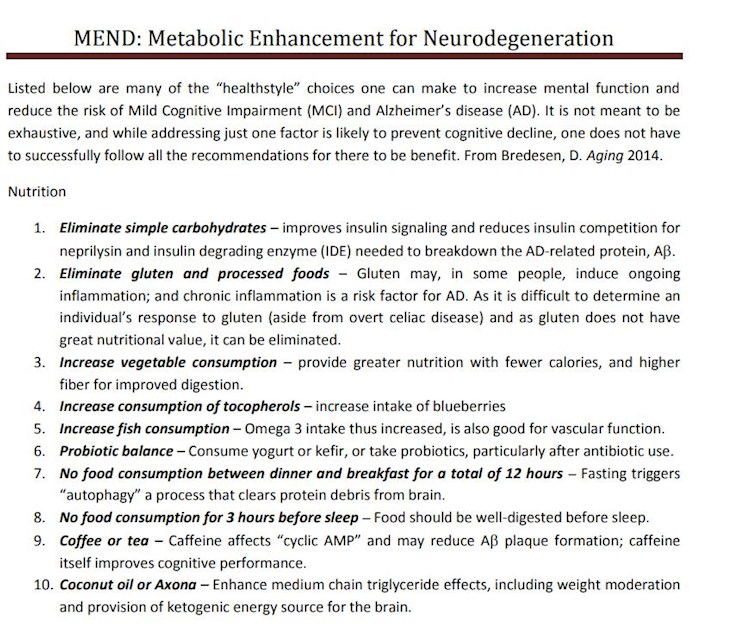MEND was developed by Dr. Dale Bredesen of the University of California at Los Angeles (UCLA) in an effort to enhance metabolism and prevent negative outcomes in those seeking Alzheimer’s and Parkinson’s Disease treatments. MEND, which is based on an assessment of 36 different factors impacting health, was shown in a small study trial to reverse memory loss and cognitive decline in patients with early Alzheimer’s.
MEND improves metabolic function through complex, wide-ranging efforts to address various functions at once. Optimizing overall lifestyle and nutrition, maximizing sleep, and using supplements are just some of the ways to create a healthier lifestyle.
drmariamaricich.com/storage...
MEND: Metabolic Enhancement for Neurodegeneration
1
Listed below are many of the “healthstyle” choices one can make to increase mental function and reduce the risk of Mild Cognitive Impairment (MCI) and Alzheimer’s disease (AD). It is not meant to be exhaustive, and while addressing just one factor is likely to prevent cognitive decline, one does not have to successfully follow all the recommendations for there to be benefit. From Bredesen, D. Aging 2014.
Nutrition
1. Eliminate simple carbohydrates – improves insulin signaling and reduces insulin competition for neprilysin and insulin degrading enzyme (IDE) needed to breakdown the AD-related protein, A.
2. Eliminate gluten and processed foods – Gluten may, in some people, induce ongoing inflammation; and chronic inflammation is a risk factor for AD. As it is difficult to determine an individual’s response to gluten (aside from overt celiac disease) and as gluten does not have great nutritional value, it can be eliminated.
3. Increase vegetable consumption – provide greater nutrition with fewer calories, and higher fiber for improved digestion.
4. Increase consumption of tocopherols – increase intake of blueberries
5. Increase fish consumption – Omega 3 intake thus increased, is also good for vascular function.
6. Probiotic balance – Consume yogurt or kefir, or take probiotics, particularly after antibiotic use.
7. No food consumption between dinner and breakfast for a total of 12 hours – Fasting triggers “autophagy” a process that clears protein debris from brain.
8. No food consumption for 3 hours before sleep – Food should be well-digested before sleep.
9. Coffee or tea – Caffeine affects “cyclic AMP” and may reduce A plaque formation; caffeine itself improves cognitive performance.
10. Coconut oil or Axona – Enhance medium chain triglyceride effects, including weight moderation and provision of ketogenic energy source for the brain.
Supplements (if needed)
1. Methylcobalamin (B12) – A vitamin key to mental function. Ongoing B deficiency can lead to permanent loss of mental function. Excessive alcohol consumption can lead to B deficiency.
Found in meat, shellfish and dairy, but some medical conditions can lead to deficiency.
2. D3- Another vitamin critical to mental functioning, can often be lower in older people.
3. Fish oil – A source of omega 3 oils, good for vascular function.
4. Coenzyme Q or ubiquinol, a-lipoic acid CoQ or ubiquinol, α-lipoic acid, PQQ (polyquinoline quinone), NAC (N-acetyl cysteine), ALCAR (acetyl-L-carnitine), Se, Zn, resveratrol, ascorbate, and thiamine all improve mitochondrial function (cellular energy production).
5. Curcumin (turmeric) – Anti-inflammatory and anti-oxidant, can be taken as a supplement or used in food.
6. Synaptic structural components – Synapses are cell structures through which signal are sent by neurons in the brain, to support maintenance of synapses, citicholineand omega 3 such as docosahexaenoic acid (DHA) can be taken.
7. Resveratrol –Is “anti-aging” and increases the effects of sirtuin T1.
8. Pantothenic acid (vitamin B5) – This nutrient is required for acetylcholine production. ACh is the neurotransmitter of the cholinergic system, the system impaired in AD.
Sleep
1. Melatonin (0.5 mg) – Improves sleep quality, important for clearance of protein debris in the brain.
2. Tryptophan (500 mg, 3 times a week if awakening) – Also to improve sleep.
3. Increase sleep duration – to at least 7-8 hours. Sleep is critical for consolidation of memory.
4. Treat sleep apnea – In some people, breathing is labored or impaired during sleep, disrupting sleep; a “CPAP” (continuous positive airway pressure) mask may be necessary.
Lifestyle factors
1. Strict oral hygiene and care – Dental decay, and the release of bacteria into the body from the mouth, can be increased in older people, leading to ongoing inflammation. Can also cause heart problems.
2. Exercise – 30 min – 1 hour 4-6 days a week. Increases brain-derived neurotrophic factor (BDNF), and is good for many aspects of brain function.
3. Stress reduction – yoga, meditation, “positive” personal interaction, and exercise.
4. Spatial memory challenges – learn new routes and maps
5. Stimulate all the senses – tactile, hearing (music), art, smell, and taste.
6. Socialize – maintain social interactions.
7. Brain stimulation – This goes far beyond crossword puzzles, continue to learn, teach, and participate. Try brain training software if you enjoy it.
Blood tests/Medical Care
1. C Reactive Protein – Have CRP levels determined in blood; elevated levels suggest ongoing inflammation. The source of the inflammation should then be identified and treated. Curcumin (turmeric) can lower inflammation.
2. Homocysteine – Often elevated in AD sufferers. One should have blood levels determined. Increased folic acid and B vitamin, and lower animal protein consumption can lower HC.
3. Hormones – including thyroid hormones and cortisol (stress hormone) levels.
4. Insulin – Test for insulin production and resistance.
5. Treat hearing loss – Have hearing tested and, if needed, get and use hearing aids.
6. Treat loss of vision –Keep correction up to date.
7. Review all medications and dosages
8. Test for heavy metal effects/toxicity - Chelation therapy if warranted
9. Maintain bone density – treat as necessary
